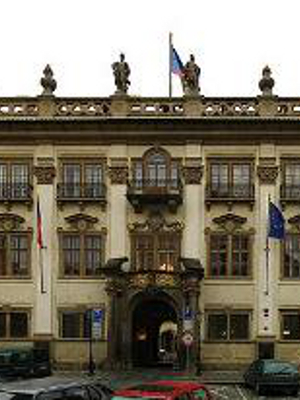In the Czech Republic, merely mentioning the Ministry of Culture elicits sighs and groans. A major study titled the National Cultural Policy for the Czech Republic for the years 2009-2014 reports the negative effects that the Ministry has.
In the Czech Republic, merely mentioning the Ministry of Culture elicits sighs and groans. Take Lucie Drdová, for example. She is the owner of a private contemporary art gallery in Prague, which receives no state funding. Though Drdová does not rely on the Ministry of Culture for financial support, she feels the impact of their shortcomings. “The Ministry of Culture doesn’t even see the importance of culture, and this is why the people [of the Czech Republic] cannot appreciate the culture and the art and see that it can enrich life,” Drdová notes.
Stepan Kubišta, Director of the New Stage, a branch of the National Theater, is more direct: “They [The Ministry of Culture] don’t know anything about culture. Leoš Válka, director of Prague’s largest and most successful art gallery DOX agrees: “The Ministry of Culture thinks that culture is something static, which will take care of itself. They think that even without their support, culture will always be here, but that is simply not true,”
By way of background, the Ministry of Culture is responsible for 30 state-funded institutions, including museums, galleries, theaters, and historic monuments. Some of the most notable of these are the National Museum in Prague and the National Theater, which has five buildings located in Prague. In addition to these 30 institutions, the Ministry of Culture also makes contributions in the form of grants to private institutions, such as DOX.
Drdová notices the impact of the poorly run Ministry of Culture through the visitors to her gallery. Foreigners confidently walk through her door into the gallery, while Czech people pace back and forth outside the windows, debating whether or not they should enter. “They are scared to be here, because they think they won’t understand it.”
Drdová believes that the poorly run Ministry leaves more responsibility to the private galleries to promote art within the Czech Republic and also to represent it on a national scene. However, this is a difficult task for small galleries like Drdová’s, which lack the funding and resources to go to art fairs and participate in other international events. Drdová believes that the Ministry could support private galleries by purchasing art through them and by promoting and importing art shows to the Czech Republic, which would increase the public’s interest in art.
Leoš Válka notes that DOX not only serves a Czech audience, but also provides a platform for social interactions with other countries, since DOX represents the Czech Republic through international exhibitions and programs. Válka currently receives a small amount of grant money from the state, which covers less than 20% of the cost of running the gallery. “They don’t realize that for them, we are a godsend, since we are quite well known outside the Czech Republic. We have had fantastic articles written about us in many important magazines and newspapers, and this is all free publicity for the city of Prague,” Valka said in a recent interview with Radio Prague.
Stepan Kubišta, whose New Stage is funded completely by the state, believes that the Ministry disconnects with those it directly serves. In September 2012, Culture Minister Alena Hanáková unexpectedly fired the director of the National Theater. Many actors, writers, and directors were angry with the decision, and signed a petition against the director’s dismissal. Hanáková said the dismissal was not revocable and put a friend of hers in place as the interim director. “The Ministry of Culture thinks of the General Director as just an employee,” Kubista explained. He proposes a board, composed of “people who know something about theater,” that serves as a middle ground between the Ministry and the National Theater. The board would work together to make decisions and help with fundraising and would provide a platform for leaders from the National Theater to express their needs to the Ministry of Culture. Currently there is disagreement between the needs of the National Theater and what the Ministry provides.
A major study titled the National Cultural Policy for the Czech Republic for the years 2009-2014 reports the negative effects that the Ministry has. One of the main weaknesses cited was poor management of cultural promotion and a lack of experts in the Ministry, starting with the current minister Hanáková, who has a background in education, and who never held a position related to culture until 2010, when she became a member of the Parliamentary Committee on Science, Education, Culture, Youth, and Sports. Other weaknesses cited include poor transparency, incompetent utilization of EU structural funds, and the non-existence of coordination of the state cultural policy and regional cultural policy.
The report also expresses an overall low interest in culture within the country. It concluded that Czech people do not feel that culture has a high importance in social and economic life. To support this is the fact that in the Czech Republic, there is no legislation supporting donations to cultural programs that would offer tax breaks, something which exists in many other countries.
But is the Ministry completely to blame, especially when one considers that it gets only 1% of the national budget for its entire funding and activities? The flaws are clear and easy to point out. It seems that no matter what the level of funding, the first step to improving the situation is not more funding, but better planning and most of all, better communication with those they serve, as reflected by the fact that the Ministry repeatedly failed to respond to numerous requests for an interview for this article.
published: 6. 1. 2013







